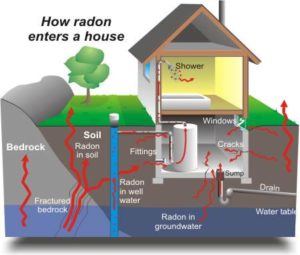
- April 17, 2019
What is Radon?
Radon is a cancer-causing radioactive gas. You can’t see, smell or taste radon. It forms naturally from the decay (breaking down) of radioactive elements, such as uranium, which are found in different amounts in soil and rock throughout the world.
Radon is present outdoors and indoors. It is normally found at very low levels in outdoor air and in drinking water from rivers and lakes. In its diluted form, it doesn’t pose health concerns. However, radon can build up to high levels and turn into a health risk in houses, schools, office buildings, or any other confined place. Radon can go into your home from any place where the house touches the soil and there is an opening.
Possible entry points into your home consist of:
-
Cracks in foundation walls and floor slabs
-
Construction joints
-
Gaps around service pipes
-
Support posts
-
Window casements
-
Floor drains
-
Sumps or cavities inside walls
-
Dirt floors
The amount of radon in your home will be determined by on numerous factors:
-
Amount of uranium in the ground
-
Number of entry points into your home
-
How well your home is ventilated
-
Health risks from radon exposure and developing lung cancer:
Your risk of cancer depends on several factors:
-
Level of radon in your house
-
How long you are exposed
-
Whether you smoke (exposure to radon and tobacco use together can significantly increase your risk of lung cancer)
Radon Testing
For most people, the largest possible source of radon exposure is in their home. But the levels vary from one house to another, even if they are next door to each other.
The only way to know if you have a radon problem is to test your home. It is simple and inexpensive.
As of October 1, 2016, Montgomery County law requires that “a single-family home located in the County must be tested for radon before completing a sale of the home.” This requirement is found in Chapter 40 of the County Code, as amended by County Bill 31-15.
Where Does the Law Apply?
The radon testing requirement applies throughout the County, except in the Town of Barnesville, the City of Rockville, the Town of Kensington, and the Town of Poolesville.
What Homes Must Be Tested? The law obliges buyer/sellers after October 1, 2016, to test single-family homes in Montgomery county state of Maryland which includes detached single family homes and townhomes, except those units that are part of a condominium or a cooperative housing corporation.
Who Must Do the Radon Test?
The law requires the seller to perform the radon test, or permit the buyer to perform the radon test. If the seller offers the buyer the opportunity to do the test, and the buyer chooses not to, the seller must perform the test to meet the statutory requirement that a test be performed. Both the seller and the buyer must receive a copy of the results of the radon test.
When Must the Test Be Performed?
In order to comply with the law, a radon test must be performed up to one year prior to the settlement date. The test must be done with an approved testing device.
Which Testing Devices Can Be Used?
The radon test must be done using a testing device approved by the Montgomery County Department of Environmental Protection (DEP). Our certified radon service team are local residents who are well-informed of the Montgomery County area and follow the National Radon Safety Board code of ethics. We work with Continuous Radon Monitors (CM), which collect data from an hour-by-hour reading for 48 hours. The results are provided the same day as the monitor’s readings are completed.
Testing Process
1. Determine your timeline.
Indoor air testing for radon levels requires a minimum of 48 hours using continuous radon monitors and closed building conditions twelve hours prior to the start and during the testing. We use SunNuclear monitors which are approved by NRPP, calibrated and tested according to the NIST standards. If you are on a limited timeline, please keep this time guideline in mind. Moreover, we can’t guarantee we’ll have a testing monitor available without a few days’ notice as summer is the busiest time in real estate.
2. Establish “closed-house” conditions
Radon levels fluctuate based on the day, season, weather, and other natural forces. For example, barometric pressure changes can change soil-gas pressures and the amount of radon entering a home. It also depends on the resident’s lifestyle — do they open windows, use exhaust or ceiling fans, use an open wood fireplace, etc.
To standardize radioactive radon gas testing and to take away any lifestyle bias, “closed-house” conditions are required by NRPP and AARST for the duration of the short-term 48h testing for real estate transaction purpose. These conditions include keeping all windows and exterior doors closed (OK for the momentary entry and exit) and keeping all fans turned off. To ensure that homeowners and visitor are aware of the “closed-house” requirements, our certified radon measurement provider will post notices in the home at the time of the test.
3. Schedule your test.
For your convenience, we provide three different methods for scheduling:
-
Online – Schedule a Test
-
Email – chris@sprouthomeinspections.com
-
Phone – 301.674.7973
4. Test and results
The radon measurement test will last for 48 hours, at which point our measurement provider collects the test and delivers the report to the client and/or the agent the same day. The report will include all 48 hourly measurements graph and the average radon level in the house.
Radon Contingency in Real Estate Transactions
On October 1st, 2016 a new radioactive gas radon law in Montgomery County, Maryland went into effect and it is important that home-sellers are aware of the implications of this law and home-buyers are aware of radon contingency in real estate transactions.
As of that date, a single family home or townhouse (with some exceptions) that is under contract cannot go to settlement until there is a radon test done on the home. Now if the buyer does not have a test done, it is the seller’s responsibility to provide the test before closing.
We recommend using real-time continuous radon testing monitors which are approved by NRPP and comply with Montgomery County law.
Where does the law apply in Montgomery County , Maryland?
The radon testing requirement applies to detached homes and townhomes in Montgomery County, Maryland. Exemptions include:
• Properties in Barnesville, Kensington, Poolesville and the City of Rockville;
• Units that are part of a condominium or a cooperative housing corporation;
• Sales that are exempt from the transfer tax under MD Tax-Property Code, §13207, as amended;
• Sales by a lender or an affiliate or subsidiary of a lender that acquired the home by foreclosure or deed in lieu of foreclosure;
• A sheriff’s sale, tax sale, or sale by foreclosure, partition, or by a court-appointed trustee;
• A transfer by a fiduciary in the course of the administration of a decedent’s estate, guardianship, conservatorship, or trust; or
• A transfer of a home to be converted by the buyer into a use other than residential, or to be demolished.
2 Responses to “Everything You Need to Know About Radon Testing”
Leave a Reply




Thanks for helping me understand that the radon test will last for 48 hours. With that in mind, I should allot 2 days for this process when hiring a professional. I just need to ensure that I will buy a house that is safe this year that is why I need to have it checked to keep my baby from harmful chemicals.
I like that you mentioned how radon doesn’t pose any health concerns when it is its diluted form. I was watching the late night news yesterday and I saw a news about an incident that concerns radon. This got me quite curious about the radon levels inside our house so I am thinking of calling for radon inspection services.